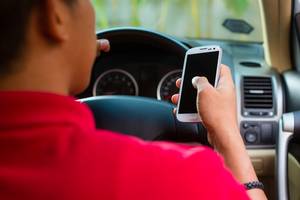California’s Pure Comparative Negligence Standard
 Determining liability in some personal injury cases is fairly straightforward. For example, you are sitting at a red light and your car is rear-ended by a driver who was under the influence of alcohol and speeding. That driver is likely to be held fully liable for any injuries you may have sustained. What if, however, your own actions played a role in causing your injuries? For example, you are driving along a city street, over the posted the speed limit while texting on your cell phone. Another driver blatantly runs a red light and crashes into your car. Could you still collect compensation for your injuries?
Determining liability in some personal injury cases is fairly straightforward. For example, you are sitting at a red light and your car is rear-ended by a driver who was under the influence of alcohol and speeding. That driver is likely to be held fully liable for any injuries you may have sustained. What if, however, your own actions played a role in causing your injuries? For example, you are driving along a city street, over the posted the speed limit while texting on your cell phone. Another driver blatantly runs a red light and crashes into your car. Could you still collect compensation for your injuries?
All or Nothing
Prior to 1975, the answer to that question would have been a flat no. Under the law in place at the time, if your own actions or negligence were found in any way to have contributed to your injuries, recovery would be completely barred. In 1975, the California Supreme Court’s ruling on Li v. Yellow Cab, set a new standard for the state, one that was determined to be more equitable albeit more complex. In its the ruling, the state’s High Court recognized that an “all-or-nothing” approach to recovery was outdated and that each contributor to an injury case should be held justly liable.
Comparative Negligence
The result of Li forced would-be litigants to look at their cases from a new perspective. When considering liability, California courts must now consider the percent of liability attributable to each party in the case. Any damages subsequently awarded to a claimant or plaintiff would be reduced by the percentage of his or her own contributory negligence in causing the injuries. Pure comparative negligence means that a plaintiff may still collect even if he or she is found to be 99 percent liable, but the recovery would be limited to one percent of the total damages. Thus, in the example above, you would still be permitted to pursue damages for your injuries, but they would be reduced in accordance with your court-determined negligence for speeding and illegal use of your cell phone.
It is important to keep in mind that negligent acts are not necessarily illegal acts. It is not against the law, for example, for you to ride your old bicycle without checking to be sure it is safe to ride. If you are subsequently riding on the street and a wheel falls off, causing an accident, your negligence regarding the safety of the bicycle would likely be a factor.
Get Legal Help for Your Injury Claim
If you have been hurt in an auto accident, or any other type of accident, the lawyer you choose can make a difference. Contact the experienced California personal injury lawyers at the Janoff Law. Our knowledgeable team will review your case, help you understand your options, and work with you in collecting the compensation you deserve. Call 408-286-2300 to schedule your free consultation and put our experience and skill in your corner.
Sources:
Li v. Yellow Cab Co. , 13 Cal.3d 804








